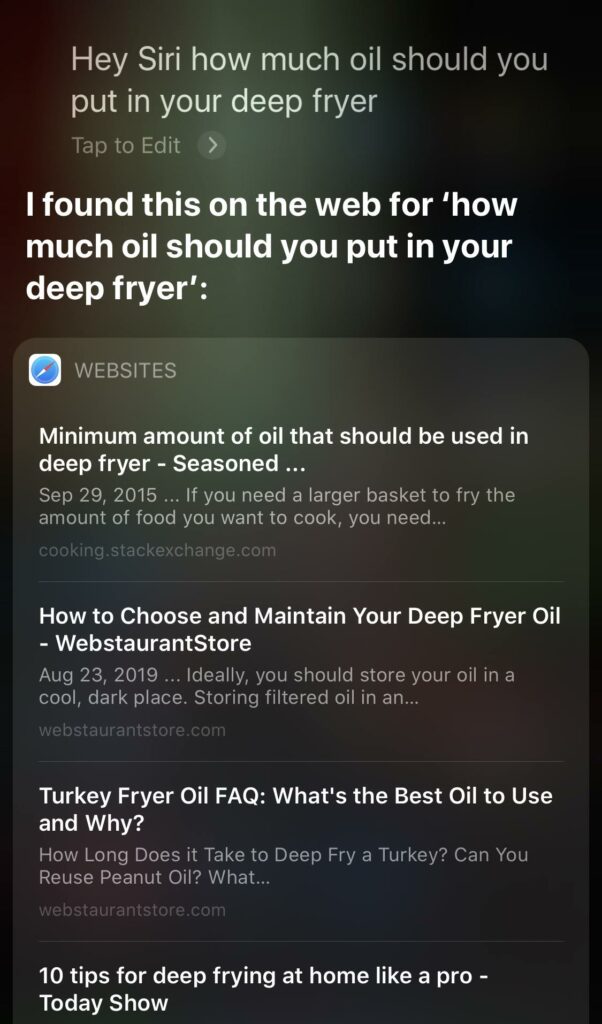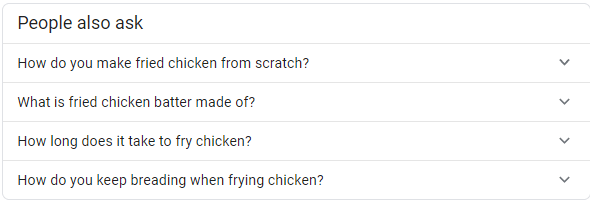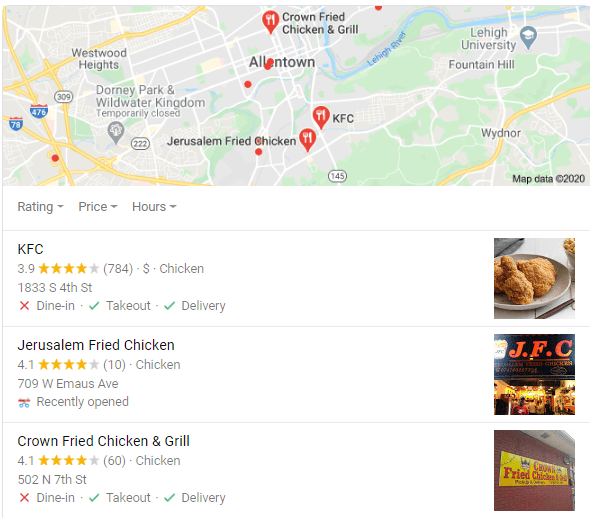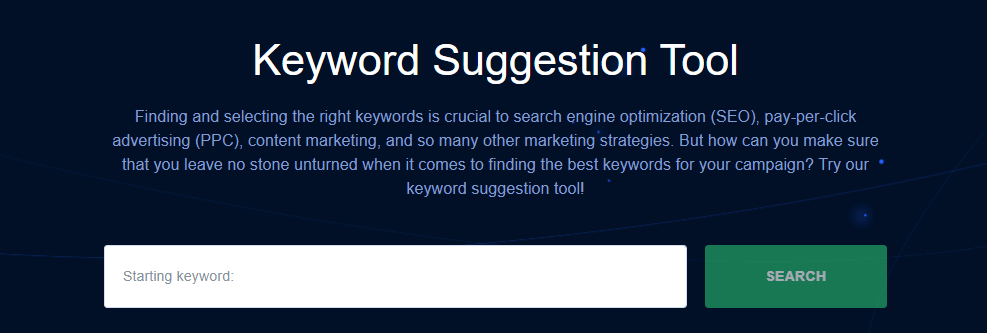-
 11 min. read
11 min. read
-
 Macy Storm
Macy Storm Content Marketing Consultant
Content Marketing Consultant
- Macy is a content marketing consultant with over five years of experience creating content for dozens of industries including home services, recreation, and education. She’s written about every marketing topic under the sun, from SEO to AI to email marketing. Her work has been featured by Search Engine Journal, HubSpot, Entrepreneur, Clutch, and more. In her free time, Macy enjoys crafting, reading comic books, and walking her dog Daisy.
What is Voice Search Optimization?
Voice search optimization is the process of optimizing website content to rank higher in search results when users ask questions using voice commands on devices like smartphones or smart speakers.
Voice search optimization is the process of optimizing your website pages to appear at the top of the results when users conduct verbal searches. Voice search SEO is essential for ensuring your website appears in the results for users who use voice assistants.
Sales from voice search are expected to reach $40 billion in 2025. If you haven’t invested in voice search optimization for your business, you’re missing a prime opportunity to earn sales for your company.
But what is voice search optimization? In this post, we’ll answer that question and more. Keep reading to get answers to questions like:
- What is voice search optimization?
- How does voice search work?
- Why do I need to invest in a voice search optimization strategy?
- How do I optimize for voice search?
Get the latest information about voice search optimization by subscribing to Revenue Weekly for voice search tips and tricks!
What is voice search optimization?
Voice search optimization is the process of optimizing your pages to appear in voice searches. When you optimize for voice search, you optimize for the way people conduct verbal searches. Voice search optimization gives you the chance to have your pages read out loud by a voice search device.
How voice search works
The voice search process is simple.
Here’s how voice search works:
- Users summon the voice search device using the key phrase (“Ok Google,” “Alexa,”)
- Users ask a question
- The voice search device reads the answer
When you ask Google a question on devices like Google Home, it will sometimes tell you, “I sent you a link in your Google Assistant” (or something similar), and then send you a link to the website it read the answer from in Google Assistant. Devices like Siri, however, are a little more unique.  For many queries, Siri won’t read the answer aloud, but rather, will tell you what it found on the web that fits your search query.
For many queries, Siri won’t read the answer aloud, but rather, will tell you what it found on the web that fits your search query.
Why do I need to invest in a voice search optimization strategy?
A voice search optimization strategy is critical for your business.
With more people using search devices, you must invest in this strategy to reach those people, especially if you operate locally since more than 55% of people use voice search to find nearby businesses. Here are just a few stats that show the importance of optimizing your site for voice search SEO.
Sales from voice search amount to more than $2 billion
Voice searches drive sales. People are using these devices to make purchases and find businesses.
If you aren’t optimizing for voice search, you’re missing out on revenue. By investing in voice search optimization, you can help more leads find your business.
More than 1 billion voice searches happen each month
People use voice search devices to find information, products, and more. With over 1 billion voice searches happening each month, it’s critical that you have a voice search optimization strategy in place so you can reach people who search with these devices.
Brands that adopt voice search grew digital commerce revenue by 30% in 2025
Voice search holds great potential for your business in the future.
By investing in voice search optimization, you can help your business increase revenue. Search engine optimization (SEO) is a strategy that takes time, so it’s best to invest in it now so you can reap the benefits later.
Voice search will account for 50% of all searches in 2025
Voice search will continue to grow and become more popular as a medium for getting information. As more people get voice search devices, more voice search queries will happen.
If you want to reach these people, you must invest in voice search optimization.
How to optimize for voice search: 4 voice search optimization tips
Ready to start optimizing for voice search? Check out these four voice search optimization tips to help you get started!
1. Optimize for conversational queries
Voice search queries are different than standard questions. People speak differently than the way they type, so you need to account for that in your optimization strategy. For example, someone might type “how to make fried chicken” on a desktop, but on voice search, they would say, “How do I make fried chicken?” It’s subtle, but these search queries differ because voice search is a conversation.
Users talk to their devices, so they conduct queries as if they were asking a family member or friend. Additionally, some verbal queries are more directional than written queries. So, someone might type “recipes for fried chicken,” but when searching on a voice search device, they’d say “show me recipes for fried chicken.” In this case, voice searchers are giving a command of what they want the search device to do.
If you want to know how to optimize for voice search, you must optimize for conversational queries. Brainstorm different questions your audience might have related to topics on your pages. For example, if people were verbally searching for how to make fried chicken, they might ask:
- How do I make fried chicken?
- What’s the best way to make fried chicken?
- What do I need to make fried chicken?
These are all related queries you’ll want to account for and optimize for in your search strategy.
Ok, Google, show me a bonus tip: If you’re feeling stuck on trying to think of other questions your audience might ask, type your idea into Google and check out the People Also Ask section. It’s filled with related queries people ask, which can help spark ideas for you.

2. Optimize your local presence
Did you know over 55% of people use voice search to find local businesses? If you want to know how to optimize for voice search, start by building your local presence. The most significant component of this is your Google Business Profile listing, which is the listing that appears when users conduct local searches.
 First, you’ll want to claim this listing. Next, you’ll fill out your company’s information completely. You’ll verify your name, address, and phone number to ensure you’re sharing the correct information.
First, you’ll want to claim this listing. Next, you’ll fill out your company’s information completely. You’ll verify your name, address, and phone number to ensure you’re sharing the correct information.
Aside from that information, you’ll want to:
- Update your hours of operation
- Add photos to your listing
- Include a short blurb about your business
Having a complete listing will help users get the information they need when they discover your company through voice search. Claiming your local listing will help your business appear in more local voice search queries so you can drive traffic to your location. Aside from claiming your local listing, you’ll also want to integrate locally relevant keywords into your site.
Keywords like “fried chicken restaurant in Los Angeles” and “fried chicken in LA” are locally relevant keywords that can help drive more leads to your business.
Ok, Google, show me a bonus tip: When you optimize for local keywords, account for regional slang and dialect. You may target a region that uses “pop” instead of “soda,” for example. Conduct research for these different types of slang because users will search based on their area’s dialect (which may not be the same as where your company operates).
3. Focus on giving answers directly
If you want to get the most from your voice search optimization strategy, start by answering queries directly. Did you know that 50% of searches rely on featured snippets? The featured snippet appears at the top of the search results in a box.

Do you know what featured snippets do? They answer queries directly. Featured snippets aim to provide users with an answer fast.
So, to get into this coveted position, you must provide direct answers to questions. Let’s say someone verbally searches, “What is fried chicken batter made of?” Which example do you think is more likely to appear as the featured snippet?
Example A. Fried chicken batter composes of all-purpose flour, garlic salt, pepper, and poultry season. To make the batter, you will need three cups of flour and a teaspoon each of garlic salt, pepper, and poultry seasoning.
Mix all the ingredients together to create your batter.
Example B. Fried chicken batter composes of numerous ingredients. The first ingredient is flour. Your flour should be all-purpose flour because it works best for the chicken.
Other types of flour might not get the coating you want for your chicken. The second ingredient is…
If you answered Example A, you’re correct. Example A answers the user’s query directly and provides them with the information they need.
Example B, however, takes too much time explaining every small detail instead of delivering a direct answer. By giving precise answers, you’ll increase your chances of appearing at the top of search results so Google can read your listing to relevant searchers.
Ok, Google, show me a bonus tip: A great way to answer questions directly is to create an FAQ page. FAQ pages can help you rank for voice queries because you deliver direct answers to common questions people ask about your business or industry.
4. Follow SEO best practices
Many people think that because users can’t see your website, it doesn’t matter how it runs or what kind of experience it delivers. The reality, however, is that voice search devices use search results to provide users with answers. Voice search devices pull answers from the top of the search results, so you need to optimize to appear at the top.
If you’re not optimizing for SEO, you’re not likely to appear in voice searches. Follow these SEO best practices to help you rank better in search results:
- Integrate keywords on your page
If you want to appear in relevant searches, choose relevant keywords, and integrate them into your site. You’ll want to focus on long-tail keywords, which contain three or more words, to help you appear in front of more relevant leads. You can use a tool like KeywordsFX to find relevant key terms for your campaign.

- Optimize for mobile
Many of the voice search programs are on mobile devices or use mobile apps to direct you to the website that fits your query. Ensure your website has a responsive design, which enables your website to adapt to whatever device someone uses. Responsive design provides users with a mobile version of your site that makes browsing easier.
- Speed up your site
If a voice searcher wants to learn more about your business, they don’t want to wait to get the information. Ensure your site loads quickly enough by using a tool like Google PageSpeed Insights to learn how you can improve site load time. If you’re feeling overwhelmed by the tool, you can always invest in page speed services.
Ok, Google, show me a bonus tip: When optimizing for SEO, write your content for humans first and search engines second.
This practice is especially helpful for voice searches because people use their natural language to search. Writing for humans will help you rank better in search results and reach more voice searchers.
What is voice search optimization? Your key to boosting sales
Voice search optimization will help you drive more leads for your business and earn more sales.
By following these voice search optimization tips, you’ll be on your way to driving more voice searchers to your company. Feeling overwhelmed by everything you need to do to optimize for voice searches? If so, you don’t have to go at it alone.
We have a team of over 500 SEO specialists who can help you optimize your voice search campaign and drive more valuable leads for your company. Want to learn more about how we can help you grow? Give us a call at 888-601-5359 or contact us online to speak with a strategist about how our featured snippet creation and optimization services can help your business reach a new pool of customers through voice search!
-
 Macy is a content marketing consultant with over five years of experience creating content for dozens of industries including home services, recreation, and education. She’s written about every marketing topic under the sun, from SEO to AI to email marketing. Her work has been featured by Search Engine Journal, HubSpot, Entrepreneur, Clutch, and more. In her free time, Macy enjoys crafting, reading comic books, and walking her dog Daisy.
Macy is a content marketing consultant with over five years of experience creating content for dozens of industries including home services, recreation, and education. She’s written about every marketing topic under the sun, from SEO to AI to email marketing. Her work has been featured by Search Engine Journal, HubSpot, Entrepreneur, Clutch, and more. In her free time, Macy enjoys crafting, reading comic books, and walking her dog Daisy. -

WebFX is a full-service marketing agency with 1,100+ client reviews and a 4.9-star rating on Clutch! Find out how our expert team and revenue-accelerating tech can drive results for you! Learn more
Try our free Marketing Calculator
Craft a tailored online marketing strategy! Utilize our free Internet marketing calculator for a custom plan based on your location, reach, timeframe, and budget.
Plan Your Marketing Budget

Proven Marketing Strategies

Proven Marketing Strategies
Try our free Marketing Calculator
Craft a tailored online marketing strategy! Utilize our free Internet marketing calculator for a custom plan based on your location, reach, timeframe, and budget.
Plan Your Marketing Budget
What to read next




